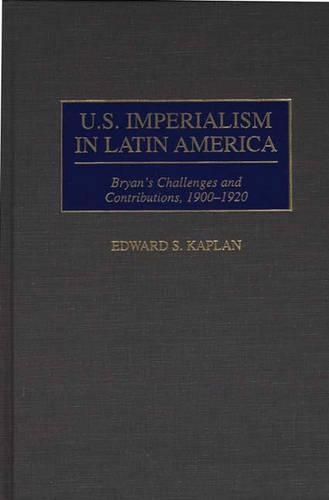
U.S. Imperialism in Latin America: Bryan's Challenges and Contributions, 1900-1920
(Hardback)
Publishing Details
U.S. Imperialism in Latin America: Bryan's Challenges and Contributions, 1900-1920
By (Author) Edward Kaplan
Bloomsbury Publishing PLC
Praeger Publishers Inc
26th January 1998
United States
Classifications
Tertiary Education
Non Fiction
Diplomacy
Colonialism and imperialism
Central / national / federal government policies
327.7308
Physical Properties
Hardback
176
Description
Latin America's proximity to the United States made the improvement of relations between the two regions imperative in the first two decades of the 20th century. William Jennings Bryan, Secretary of State for Woodrow Wilson until 1915, was largely responsible for the task. Although Bryan has denounced as imperialistic his predecessors' political and economic intervention in Latin America, his own policies also had an imperialist tone. Bran designed in June 915, but his actions while in office served as the foundation for later intervention in both Haiti and the Dominican Republic. This work details Bryan's attitudes toward Latin American prior to assuming the title of secretary of state, his actions while in office, and his political stance after resignation. Six topical chapters cover Bryan's policies, toward Nicaragua, Haiti, the Deominican Republic, Mexico, the Panama Canal Tolls controversy, and the Columbian Treaty. The work concludes with an analysis of Bryan's inconsistent attitude on imperialism.
Reviews
.,."this book offers some valuable insights and may be of interest to the general reader."-NOTAS
...this book offers some valuable insights and may be of interest to the general reader.-NOTAS
..."this book offers some valuable insights and may be of interest to the general reader."-NOTAS
Author Bio
EDWARD S. KAPLAN is Professor in the Social Science Department at New York City Technical College of the City University of New York.
